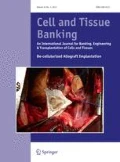Abstract
The neuropathological examination of postmortem human brain tissue is an essential resource for the definitive diagnosis and research on neurodegenerative diseases. Due to the growing need of donated brains to supply the Brain Banks, the understanding of the factors associated with the consent for the donation in our context is an important aspect of the process of brain donation. The verbal answers and the donation consent rate were evaluated in three groups: 30 relatives of patients who underwent verification of the cause of death, 14 patients assisted at a neurology ambulatory outpatient clinic, and 18 patients’ relatives. The donation consent rates were of 46.6, 92.8 and 88.8 %, respectively. The main reasons for refusal were the disagreement with the autopsy, philosophical and religious issues, objections from other family members, and the consideration of the wishes of the deceased. The consent was specially motivated by the interest in the advances of scientific knowledge, altruistic reasons and the personal experiences with the disease. Factors as the emotional fragility at the moment of death, the beliefs, family matters, and the lack of knowledge are key elements in the donation process. Future goals include the establishment of a brain donor program with the support of academic institutions, hospitals, scientists, community, patient’s associations and autopsy assistants. Approaching patients and relatives in specialized ambulatories clinic during assistance is probably the most efficient mean of obtaining brains for research.




Similar content being viewed by others
References
Shaw K et al (2012) Successful recruitment of centenarians for post-mortem brain donation: results from the Georgia centenarian study. J Biosci Med 2(1):124.
Azizi L, Garrick TM, Harper CG (2006) Brain donation for research: strong support in Australia. J Clin Neurosci 13(4):449–452
Beardsall L, Barkley C, O’Sullivan A (1992) The response of elderly community residents to request for brain donation: an interim report. Int J Geriatr Psychiatry 7(3):199–202
Darnell KR, McGuire C, Danner DD (2011) African American participation in Alzheimer’s disease research that includes brain donation. Am J Alzheimers Dis Other Dement 26(6):469–476
Dembogurski JE, Azenha MV, Amaral APC et al (2011) Dados preliminares de um modelo de programa de doação de corpos: programa de Doação de Corpos da UFCSPA. Rev AMRIGS 55(1):7–10
Eatough V, Shaw K, Lees A (2012) Banking on brains: insights of brain donor relatives and friends from an experiential perspective. Psychol Health 27(11):1271–1290
Garrick T, Azizi L, Merrick J, Harper C (2003) Brain donation for research, what do people say? Intern Med J 33(9–10):475
Garrick T, Sundqvist N, Dobbins T, Azizi L, Harper C (2009) Factors that influence decisions by families to donate brain tissue for medical research. Cell Tissue Bank 10(4):309–315
Harris C, Kiger A, Counsell C (2013) Attitudes to brain donation for Parkinson’s research and how to ask: a qualitative study with suggested guidelines for practice. J Adv Nurs 69(5):1096–1108
Jefferson AL, Lambe S, Cook E, Pimontel M, Palmisano J, Chaisson C (2011) Factors associated with African-American and white elders’ participation in a brain donation program. Alzheimer Dis Assoc Disord 25(1):11–16
Kaye JÁ, Dame A, Lehman S, Sexton G (1999) Factors associated with brain donation among healthy elderly people. J Gerontol A Biol Sci Med Sci 54(11):M560–M564
Kuhta T, Zadikoff C, Simuni T, Martel A, Williams K, Videnovic A (2011) Brain donation—what do patients with movement disorders know and how do they feel about it? Park Relat Disord 17(3):204–207
Lambe S, Cantwell N, Islam F, Horvath K, Jefferson AL (2011) Perceptions, knowledge, incentives, and barriers of brain donation among African American elders enrolled in an Alzheimer’s research program. Gerontologist 51(1):28–38
Millar T, Lerpiniere C, Walker R, Smith C, Bell JE (2008) Postmortem tissue donation for research: a positive opportunity? Br J Nurs 17(10):644–649
Schmitt FA, Wetherby MM, Wekstein DR, Dearth CM, Markesbery WR (2001) Brain donation in normal aging: procedures, motivations, and donor characteristics from the Biologically Resilient Adults in Neurological Studies (BRAiNS) Project. Gerontologist 41(6):716–722
Solomon SA, Adams KH (1993) Attitudes of relatives to autopsies of elderly patients. Age Ageing 22(3):205–208
Stevens M (1998) Factors influencing decisions about donation of the brain for research purposes. Age Ageing 27(5):623–629
Sundqvist N, Garrick T, Harding A (2012) Families’ reflections on the process of brain donation following coronial autopsy. Cell Tissue Bank 13(1):89–101
Vonsattel JPG, Amaya MP, Keller CE (2008) Twenty-first century brain banking. Processing brains for research: the Columbia University methods. Acta Neuropathol 115:509–532
Acknowledgments
This research was carried out with the financial aid of the Research Support Foundation of Rio Grande do Sul—FAPERGS (Fundação de Amparo à Pesquisa do Rio Grande do Sul). The authors thank the Forensic Department of the General Institute of Examinations (Department of Forensic Medicine) of Rio Grande do Sul for their support.
Author information
Authors and Affiliations
Corresponding author
Rights and permissions
About this article
Cite this article
Fonseca, M.K., Rodrigues-Neto, E., Costa, A.S.R. et al. Assessing families’ and patients’ attitudes toward brain donation for research purposes in a Brazilian population sample. Cell Tissue Bank 16, 287–294 (2015). https://doi.org/10.1007/s10561-014-9465-6
Received:
Accepted:
Published:
Issue Date:
DOI: https://doi.org/10.1007/s10561-014-9465-6



